山崎 雅弘
@mas__yamazaki さんによると、
――27日付の米紙ワシントン・ポストは、安倍晋三首相のインタビュー記事を掲載(時事)http://bit.ly/1IGF71Y (下記〔資料-2〕参照)「首相はいわゆる従軍慰安婦問題について見解を問われ、『人身売買の犠牲になり、筆舌に尽くしがたい痛みと苦しみを経験した人々を思うとき、私の心は痛む』と語った」〔19:49 - 2015年3月28日 〕――
とのことだ。
問題は、
「人身売買」に政府(軍)の関与を認めて「私の心は痛む」と
述べたのかどうかだ。
記事は、
下に〔資料〕として掲げる通りだ。
山崎氏は、
――、「人身売買の犠牲者になった人々」という言い方はしているものの、日本政府の関与や責任には一切触れていない。他人事として論じている。〔19:58 - 2015年3月28日 〕 ――
と評しておられる。
該当箇所は、
赤字で表示しておいた。
安倍某は、
朝日新聞が慰安婦の記事で
「日本を卑しめた」
と罵った。
報道されたこととの比較で、
安倍某が考える
「慰安婦」につきした
“国辱的でない”
表現をどんな風にしたのか自分で確かめて欲しい。
〔資料〕
「David Ignatius’s full interview with Japanese Prime Minister Shinzo Abe」
The Washington Post(March 26)
☆ 記事URL:http://www.washingtonpost.com/blogs/post-partisan/wp/2015/03/26/david-ignatiuss-full-interview-with-japanese-prime-minister-shinzo-abe/
(ワシントン・ポスト紙記事(原文))
Editor’s note: In his Friday column, David Ignatius writes about his interview with Japan’s prime minister, Shinzo Abe. Below is the complete transcript of their interview.
DAVID IGNATIUS: I want to start with economics and the economic policies that we call “Abenomics.” Explain to me the way that your economic policies are different from previous efforts to stimulate the Japanese economy and get out of deflation and, beyond that, what you’ve learned from your first several years about what works and what doesn’t. And a final question: We’ve seen the first three “arrows” of Abenomics. The third arrow of structural reforms is just beginning, but people wonder if perhaps there’s a fourth arrow coming, and what that might be.
PRIME MINISTER SHINZO ABE: Well, first of all, since 1997, for more than 15 years, the Japanese economy has been in a doldrum, suffering from long-lasting deflation. But during this period, of course, various economic policies were introduced. Unfortunately, they did not culminate in Japan exiting from deflation. So, we decided to go for bold monetary policy which had not been taken before. In Japan, some people argued that this policy of bold monetary policy would be effective for combating deflation, and there were opposing opinions about this policy, but nevertheless we decided to go for bold monetary policy, together with flexible fiscal policy. And also we came up with a growth strategy that would be strengthened as time goes forward. And these three policies would be introduced simultaneously. That was something new. This kind of policy had not been taken before.
I think we are in the process of coming out of deflation. And we are in the process of changing the deflationary mindset. As a result, for the last two years, in real terms, our economy has grown by 8 trillion yen and in nominal terms by 17 trillion yen. The unemployment rate is at the lowest position in the last 20 years. And wage increases that happened last year were the first time in the last 15 years. I assume that come April we will have another round of wage increases, which will be even more than what happened last year. That’s what I think. In the last two years, what was lagging behind was the hefty growth of exports. However, in the recent past exports are again rising. So there is no doubt that the macroeconomic situation is going for the better. However, what we have not been able to achieve so far is the actual feeling that this macroeconomic growth is happening. This actual feeling is not shared by the people in all corners of Japan, as well as those who are working in SMEs [small and medium-sized enterprises] or micro-industries. They have not been able to feel, actually, the benefits of economic change.
If you ask whether there is a fourth arrow: If there was a fourth arrow, I think that would be targeting the local regions. We would be introducing policies that will really support the growth capabilities of the local regions.
You spoke of the deflationary psychology that gripped Japan for these 15 years. What was that psychology, and how do you want to change it?
The first thing about the deflationary mindset is the loss of confidence, saying that Japan will never be able to grow. And another aspect of that is what is happening in the corporate world. This could be regarded as a sequel to the bursting of the bubble economy. Corporations were very cautious, overly cautious, about making capital expenditures, and also corporations were very cautious about investing in human resources or increasing their wages. On the other hand, the prices of commodities did not rise, so no increase in commodity prices became the common sense in the mindset of the Japanese people. In that sense, the consumers will wait and wait until they make a new consumption, and as I mentioned in the corporate sector, they will refrain from making any further investment. In other words, the best thing for them, in the deflationary mindset, is to hold on to cash. That’s why in the corporate sector there was an increase in internal reserve and, on the consumption side, saving increased.
The famous economist John Maynard Keynes said that in the end, economic growth is about “animal spirits.” Is Abenomics about returning animal spirits to Japan, and what will that look like?
I think what is meant by animal spirits is to be pro-active on all things that you do. For example, in the mind of management they will try to increase their revenue from sales, and they will try to increase their profits, and they will be positively investing in human resources which will be necessary in growing the company. That would be the animal spirits. I think, exactly, Japan is in the process of regaining this animal spirit.
A final economic question, prime minister, is a cyclical, long-term one. Japan is a country that for demographic reasons some analysts say is in a process of long-term slowing — that there’s only so much you can do. I wonder what your assessment is of that, and when you think ahead ten years, 20 years, what you think a stable growth trajectory for Japan might be.
Well, about the declining population, we know that it is not possible to reverse this trend immediately. However, I guess there are two things which are needed in order to grow even under the situation of declining population. Two points: First, I mentioned previously that it is important to incorporate the vitality, or induce the vitality, of the local regions. I think this local region vitality is also effective in stopping this trend of declining population. Actually, compared with a metropolitan region like Tokyo, local cities have higher birthrates. Despite this fact, young people from high-birthrate regions are migrating to low-birthrate metropolitan regions.
So this trend is something that I want to change. That means that we will have to create a place of employment in local regions, and we will have to work hard for attractive community building, and also we will have to have policies that will make living in local regions attractive, so that people will enjoy their lives, and enjoy their possibilities in local regions. We have to explore that situation on the side of corporations. Maybe there is a possibility of relocating “headquarter” functions to local regions. Then the working people there will raise the birthrate and there will be better work-life balance. That will all lead into a virtuous cycle.
Other areas I would like to emphasize would be incorporating and capitalizing on the vitality of women. So far, hitherto, we were not able to utilize in an effective way that vitality of women in this society. So we must change that. Also, we must create a situation where elderly people can continue to work, utilizing their experience and knowledge in the workplace. And also people with disability must be able to find places to work in this society. Also, emphasis would be placed on enhancing productivity in the manufacturing process. That means greater efficiency, automation and greater use of robotics. These will be areas that I will emphasize.
Let me turn, Mr. Prime Minister, to security issues. And let me begin with the obvious first question for Japan, and the United States as well, which is the fact of a rising China. I’d like to ask you about your own approach to China since you’ve been prime minister. You have been fairly tough in stating your views, certainly on the issue of the East China Sea and the Senkaku Islands. I wonder, first, if you think that’s had some effect on Chinese leaders, on President Xi, and second, whether you think it’s now possible to maintain a path of cooperation with China — once they realize that Japan won’t be pushed around.
First of all, the peaceful development of China gives an opportunity to Japan as well as the whole world. Last year in November on the occasion of the APEC [Asia-Pacific Economic Cooperation] meeting in Beijing we had the summit talks between Japan and China. And we returned to the cardinal position of a “mutually beneficial relationship based on common strategic interests.” So it was a major step forward in improving the Sino-Japanese relationship. I think because it was a major step forward, in various areas, dialogue and cooperation have resumed. For example, the other day the LDP [Liberal Democratic Party] secretary-general resumed talks with his counterpart from the Chinese communist party.
Another development is the communication mechanism between Japan and China on the maritime areas or the airspace above the high seas. Actually, this communication mechanism was proposed during the first Abe administration, in 2006 to 2007. We called for this mechanism to be established. However, since, then, the Chinese side did not make any moves, unfortunately. But again, this time around this mechanism is being implemented.
However, militarily we must note that the Chinese defense expenditure is increasing 27 years consecutively at a growth rate of almost double-digits, year upon year. And now the defense budget of China is 3.6 times that of Japan. In the field of security, what I think is important is that we encourage the Chinese side to transparency, to observe and share international norms, and to play a constructive and collaborative role regarding regional and global issues.
Their maritime behavior is not happening only around Senkaku Islands, or East China Sea, it is also causing concern countries like Vietnam, the Philippines and other countries regarding their behavior in the South China Sea, as well. So together with the United States and ASEAN countries, we would like to urge China to become a country that will be responsible in regional issues, as well as a country that will be involved in constructive cooperation.
Let me ask you ask about an issue that will be central to your visit to Washington, which is Japan’s relationship with the United States. I want ask specifically about Japan’s military security relationship with the U.S. President Obama is often criticized at home and overseas as being a somewhat weak president in his use of force. I want to ask what Japan’s experience has been. Are you satisfied that Japan can continue to depend on U.S. military guarantees for security.
We welcome the Obama administration’s policy called the “pivot to Asia,” because it is a contributing factor to the safety and peace of the region. I think this pivot policy is playing an indispensable role in enhancing the deterrence of the U.S.-Japan alliance, as well as ensuring peace and security in the Asia-Pacific region. Last year in April, President Obama visited Japan. On that occasion he mentioned the importance of the U.S.-Japan alliance, especially for the security of the Asia-Pacific region. We were able to communicate that, together, we will be playing an important role in that regard. Also, President Obama mentioned and stated very clearly that Senkaku Islands would be an area where Article 5 of the security treaty would be applied. I think he was the first U.S. president to state this very clearly. So in that sense we place the fullest confidence in his policy.
Let me ask you know about your view of Japan’s “self-defense forces.” You’ve said in many different ways that you think it’s time for Japan to use its self-defense forces in a more proactive way, a less restrained way. Perhaps you could explain your vision of the kind of defense forces and military posture that Japan needs in the future.
We must recognize that this is the time and age when threats would easily come across national borders, with the pervasive existence of weapons of mass destruction, ballistic missiles, the spread of terrorism as well as cyber attack. Regarding Japan, the security environment around Japan has become even more tough. This is the time and age when one country alone cannot defend and protect its own peace and security. So with the countries of the world, we must cooperate and we must contribute so we can achieve the peace and stability, peace and safety, for our own country, for the region we are in as well as for the entire world.
Hitherto, there was a thinking in Japan that it is okay just to look inside Japan in order to secure peace for our own country, not shedding our eyes to the outside world. Of course, this thinking is in the process of changing in the past 15 years. But I think change occurring in the entire world is even bigger. The fact that we are currently working on new security legislation is for Japan to be able to handle and cope with that situation. In this new security legislation what we are looking at is to cope with the aggression or infiltration, which will not lead into the actual use of force, as well as to provide logistic support to other countries’ forces which would be benefiting Japan. With this new security legislation we will be able to respond to the expanded and enlarged PK [peacekeeping] operations, as well as in the limited way the exercise of collective self-defense right. With this new security legislation, what becomes possible for us is that we will be able to rescue U.S. forces that are doing the patrolling in nearby areas of Japan, once these ships are attacked. Hitherto, we were not able to rescue those ships.
I should ask you, Prime Minister: Your critics sometimes look at your policies and your advocating changes in the traditional role of the self-defense forces and argue that these policies are “militaristic.” How would you answer that?
Indeed, I did increase the defense expenditure, but it was only 0.8 percent, mind you. But this is limited to securing and protecting the lives of the Japanese people as well as the happy and peaceful daily living of the Japanese people. So what I am doing is only to discharge my responsibility of protecting the lives of the Japanese people in the context of the changing international situation and changing security environment.
With your visit to Washington coming up, what are your three most important goals for that visit? What do you hope to accomplish?
First and foremost, I would say that for the last 70 years the U.S.-Japan alliance achieved many things, and I would like to express that this alliance is an unshakeable alliance. I would like to confirm that. At the same time, I would like to confirm with my American colleagues that by strengthening the U.S.-Japan alliance we will be able to contribute to the peace and security of Asia-Pacific and the whole world.
Another point, if you will, will be the economic policy I am promoting. We are attaching great importance to the economic partnership agreements, and one of them is TPP [Trans-Pacific Partnership]. I would like to gain common understanding between the U.S. and Japan about the importance of fostering economic partnership.
A third goal would be to make the American people have more knowledge about Japan. I would like them to know more about Japan, Japanese culture, Japanese tradition, and how Japanese people are regarding the United States. We are the countries sharing universal values, such as freedom, democracy, basic values, rule of law. So we are the countries sharing those values. This is something that I’d like to express to the American people.
I wouldn’t be doing my job if I didn’t ask you whether you think it’s going to be possible to achieve a TPP agreement between the U.S. and Japan by the time of your visit.
I can’t say anything very specific, but there is no doubt that we are entering into the final leg of the negotiation. President Obama and I are sending encouraging messages to chief negotiators: Hang in there; do your work very hard.
Mr. Prime Minister, let me ask you a question about history: Every country thinks about its history; every country wants to feel comfortable with its history. You sometimes are called, by critics and friends alike, as someone who’s a “revisionist” — who wants to say that some of the things that Japan has been accused of doing in its past, as dark as it was, some of those things aren’t true. So I want to ask you: Is it accurate to say that you are a revisionist–that you would like to revise the picture of Japan so that it is, in your view, more accurate?
A: My opinion is that politicians should be humble in the face of history. And whenever history is a matter of debate, it should be left in the hands of historians and experts. First of all, I would like to state very clearly that the Abe cabinet upholds the position on the recognition of history of the previous administrations, in its entirety, including the Murayama Statement [apologizing in 1995 for the damage and suffering caused by Japan to its Asian neighbors] and the Koizumi Statement [in 2005, stating that Japan must never again take the path to war]. I have made this position very clearly, on many occasions, and we still uphold this position. Also we have made it very clear that the Abe cabinet is not reviewing the Kono Statement [in 1993, in which the Government of Japan extended its sincere apologies and remorse to all those who suffered as comfort women].
On the question of comfort women, when my thought goes to these people, who have been victimized by human trafficking and gone through immeasurable pain and suffering beyond description, my heart aches. And on this point, my thought has not changed at all from previous prime ministers. Hitherto in history, many wars have been waged. In this context, women’s human rights were violated. My hope is that the 21st century will be the first century where there will be no violation of human rights, and to that end, Japan would like to do our outmost.
PRIME MINISTER’S AIDE: This will have to be the final question
Let me ask you ask you political question about your party, the LDP, which is the foundation of modern Japan. Analysts sometimes write that the strength of the LDP is also its weakness; that it so tied to the traditional interests of Japan—agriculture, infrastructure construction, the biggest manufacturing companies—that its ability to change is limited. As I look at your leadership, it seems to me that you’re actually trying to break that box that LDP government sometimes makes for Japan. Am I right? Do you want to try to move your party away from being so tied to these interests, so that you can open Japan up?
This year marks the 60th anniversary of the birth of the LDP. We have to remind ourselves that we were able to last as long as 60 years because we were able to change, when change was necessary. Twenty years ago when there was the Uruguay Round [multi-lateral trade talks which lasted from 1986 to 1994], LDP politicians and farmers sat in expressing fierce opposition to the Uruguay Round. If the LDP today were the LDP of 20 years ago and before, we would not have been able to reform the policy of set-aside that continued for 40 years, the policy of agricultural cooperatives that continued for 60 years, or to discuss TPP. We would not have been able even to discuss these matters.
Twenty years ago, the average age of farmers was 56. Now it is 66. So if we are lagging in reform there will be an existential risk for the presence of farming in Japan. So sharing this sense of crisis is the energy and prime mover of my reform. In March, there was a general party congress of LDP. On that occasion I delivered a speech in which I said that if we want to protect the Japanese farming industry, which is very important, then we have to go through a major reform. I also said that if we want to maintain and preserve our universal health care insurance system, then we must have a reform of the health care system. Educational reform is really called for if we want to preserve a good future for our children.
My idea is not to destroy the organization of the LDP, or the people associated with it. I want to make them reformers. That’s what it is. Because of this we were able to have a very major victory three times, since I became president of LDP.――
〔資料-2〕
「慰安婦問題で「人身売買」言及=安倍首相、米紙インタビューに」
時事ドットコム(2015/03/28-10:03)
☆ 記事URL:http://www.jiji.com/jc/c?g=pol&k=2015032800121
【ワシントン時事】27日付の米紙ワシントン・ポストは、安倍晋三首相のインタビュー記事を掲載した。それによると、首相はいわゆる従軍慰安婦問題について見解を問われ、「人身売買(human trafficking)の犠牲になり、筆舌に尽くしがたい痛みと苦しみを経験した人々を思うとき、私の心は痛む」と語った。
インタビューは英訳されており、首相が実際にどのような言葉を用いたかは不明。ただ、同紙は、「首相が『人身売買』という言葉を公に使ったのは初めて」とする側近の解説も伝えている。
@mas__yamazaki さんによると、
――27日付の米紙ワシントン・ポストは、安倍晋三首相のインタビュー記事を掲載(時事)http://bit.ly/1IGF71Y (下記〔資料-2〕参照)「首相はいわゆる従軍慰安婦問題について見解を問われ、『人身売買の犠牲になり、筆舌に尽くしがたい痛みと苦しみを経験した人々を思うとき、私の心は痛む』と語った」〔19:49 - 2015年3月28日 〕――
とのことだ。
問題は、
「人身売買」に政府(軍)の関与を認めて「私の心は痛む」と
述べたのかどうかだ。
記事は、
下に〔資料〕として掲げる通りだ。
山崎氏は、
――、「人身売買の犠牲者になった人々」という言い方はしているものの、日本政府の関与や責任には一切触れていない。他人事として論じている。〔19:58 - 2015年3月28日 〕 ――
と評しておられる。
該当箇所は、
赤字で表示しておいた。
安倍某は、
朝日新聞が慰安婦の記事で
「日本を卑しめた」
と罵った。
報道されたこととの比較で、
安倍某が考える
「慰安婦」につきした
“国辱的でない”
表現をどんな風にしたのか自分で確かめて欲しい。
〔資料〕
「David Ignatius’s full interview with Japanese Prime Minister Shinzo Abe」
The Washington Post(March 26)
☆ 記事URL:http://www.washingtonpost.com/blogs/post-partisan/wp/2015/03/26/david-ignatiuss-full-interview-with-japanese-prime-minister-shinzo-abe/
(ワシントン・ポスト紙記事(原文))
Editor’s note: In his Friday column, David Ignatius writes about his interview with Japan’s prime minister, Shinzo Abe. Below is the complete transcript of their interview.
DAVID IGNATIUS: I want to start with economics and the economic policies that we call “Abenomics.” Explain to me the way that your economic policies are different from previous efforts to stimulate the Japanese economy and get out of deflation and, beyond that, what you’ve learned from your first several years about what works and what doesn’t. And a final question: We’ve seen the first three “arrows” of Abenomics. The third arrow of structural reforms is just beginning, but people wonder if perhaps there’s a fourth arrow coming, and what that might be.
PRIME MINISTER SHINZO ABE: Well, first of all, since 1997, for more than 15 years, the Japanese economy has been in a doldrum, suffering from long-lasting deflation. But during this period, of course, various economic policies were introduced. Unfortunately, they did not culminate in Japan exiting from deflation. So, we decided to go for bold monetary policy which had not been taken before. In Japan, some people argued that this policy of bold monetary policy would be effective for combating deflation, and there were opposing opinions about this policy, but nevertheless we decided to go for bold monetary policy, together with flexible fiscal policy. And also we came up with a growth strategy that would be strengthened as time goes forward. And these three policies would be introduced simultaneously. That was something new. This kind of policy had not been taken before.
I think we are in the process of coming out of deflation. And we are in the process of changing the deflationary mindset. As a result, for the last two years, in real terms, our economy has grown by 8 trillion yen and in nominal terms by 17 trillion yen. The unemployment rate is at the lowest position in the last 20 years. And wage increases that happened last year were the first time in the last 15 years. I assume that come April we will have another round of wage increases, which will be even more than what happened last year. That’s what I think. In the last two years, what was lagging behind was the hefty growth of exports. However, in the recent past exports are again rising. So there is no doubt that the macroeconomic situation is going for the better. However, what we have not been able to achieve so far is the actual feeling that this macroeconomic growth is happening. This actual feeling is not shared by the people in all corners of Japan, as well as those who are working in SMEs [small and medium-sized enterprises] or micro-industries. They have not been able to feel, actually, the benefits of economic change.
If you ask whether there is a fourth arrow: If there was a fourth arrow, I think that would be targeting the local regions. We would be introducing policies that will really support the growth capabilities of the local regions.
You spoke of the deflationary psychology that gripped Japan for these 15 years. What was that psychology, and how do you want to change it?
The first thing about the deflationary mindset is the loss of confidence, saying that Japan will never be able to grow. And another aspect of that is what is happening in the corporate world. This could be regarded as a sequel to the bursting of the bubble economy. Corporations were very cautious, overly cautious, about making capital expenditures, and also corporations were very cautious about investing in human resources or increasing their wages. On the other hand, the prices of commodities did not rise, so no increase in commodity prices became the common sense in the mindset of the Japanese people. In that sense, the consumers will wait and wait until they make a new consumption, and as I mentioned in the corporate sector, they will refrain from making any further investment. In other words, the best thing for them, in the deflationary mindset, is to hold on to cash. That’s why in the corporate sector there was an increase in internal reserve and, on the consumption side, saving increased.
The famous economist John Maynard Keynes said that in the end, economic growth is about “animal spirits.” Is Abenomics about returning animal spirits to Japan, and what will that look like?
I think what is meant by animal spirits is to be pro-active on all things that you do. For example, in the mind of management they will try to increase their revenue from sales, and they will try to increase their profits, and they will be positively investing in human resources which will be necessary in growing the company. That would be the animal spirits. I think, exactly, Japan is in the process of regaining this animal spirit.
A final economic question, prime minister, is a cyclical, long-term one. Japan is a country that for demographic reasons some analysts say is in a process of long-term slowing — that there’s only so much you can do. I wonder what your assessment is of that, and when you think ahead ten years, 20 years, what you think a stable growth trajectory for Japan might be.
Well, about the declining population, we know that it is not possible to reverse this trend immediately. However, I guess there are two things which are needed in order to grow even under the situation of declining population. Two points: First, I mentioned previously that it is important to incorporate the vitality, or induce the vitality, of the local regions. I think this local region vitality is also effective in stopping this trend of declining population. Actually, compared with a metropolitan region like Tokyo, local cities have higher birthrates. Despite this fact, young people from high-birthrate regions are migrating to low-birthrate metropolitan regions.
So this trend is something that I want to change. That means that we will have to create a place of employment in local regions, and we will have to work hard for attractive community building, and also we will have to have policies that will make living in local regions attractive, so that people will enjoy their lives, and enjoy their possibilities in local regions. We have to explore that situation on the side of corporations. Maybe there is a possibility of relocating “headquarter” functions to local regions. Then the working people there will raise the birthrate and there will be better work-life balance. That will all lead into a virtuous cycle.
Other areas I would like to emphasize would be incorporating and capitalizing on the vitality of women. So far, hitherto, we were not able to utilize in an effective way that vitality of women in this society. So we must change that. Also, we must create a situation where elderly people can continue to work, utilizing their experience and knowledge in the workplace. And also people with disability must be able to find places to work in this society. Also, emphasis would be placed on enhancing productivity in the manufacturing process. That means greater efficiency, automation and greater use of robotics. These will be areas that I will emphasize.
Let me turn, Mr. Prime Minister, to security issues. And let me begin with the obvious first question for Japan, and the United States as well, which is the fact of a rising China. I’d like to ask you about your own approach to China since you’ve been prime minister. You have been fairly tough in stating your views, certainly on the issue of the East China Sea and the Senkaku Islands. I wonder, first, if you think that’s had some effect on Chinese leaders, on President Xi, and second, whether you think it’s now possible to maintain a path of cooperation with China — once they realize that Japan won’t be pushed around.
First of all, the peaceful development of China gives an opportunity to Japan as well as the whole world. Last year in November on the occasion of the APEC [Asia-Pacific Economic Cooperation] meeting in Beijing we had the summit talks between Japan and China. And we returned to the cardinal position of a “mutually beneficial relationship based on common strategic interests.” So it was a major step forward in improving the Sino-Japanese relationship. I think because it was a major step forward, in various areas, dialogue and cooperation have resumed. For example, the other day the LDP [Liberal Democratic Party] secretary-general resumed talks with his counterpart from the Chinese communist party.
Another development is the communication mechanism between Japan and China on the maritime areas or the airspace above the high seas. Actually, this communication mechanism was proposed during the first Abe administration, in 2006 to 2007. We called for this mechanism to be established. However, since, then, the Chinese side did not make any moves, unfortunately. But again, this time around this mechanism is being implemented.
However, militarily we must note that the Chinese defense expenditure is increasing 27 years consecutively at a growth rate of almost double-digits, year upon year. And now the defense budget of China is 3.6 times that of Japan. In the field of security, what I think is important is that we encourage the Chinese side to transparency, to observe and share international norms, and to play a constructive and collaborative role regarding regional and global issues.
Their maritime behavior is not happening only around Senkaku Islands, or East China Sea, it is also causing concern countries like Vietnam, the Philippines and other countries regarding their behavior in the South China Sea, as well. So together with the United States and ASEAN countries, we would like to urge China to become a country that will be responsible in regional issues, as well as a country that will be involved in constructive cooperation.
Let me ask you ask about an issue that will be central to your visit to Washington, which is Japan’s relationship with the United States. I want ask specifically about Japan’s military security relationship with the U.S. President Obama is often criticized at home and overseas as being a somewhat weak president in his use of force. I want to ask what Japan’s experience has been. Are you satisfied that Japan can continue to depend on U.S. military guarantees for security.
We welcome the Obama administration’s policy called the “pivot to Asia,” because it is a contributing factor to the safety and peace of the region. I think this pivot policy is playing an indispensable role in enhancing the deterrence of the U.S.-Japan alliance, as well as ensuring peace and security in the Asia-Pacific region. Last year in April, President Obama visited Japan. On that occasion he mentioned the importance of the U.S.-Japan alliance, especially for the security of the Asia-Pacific region. We were able to communicate that, together, we will be playing an important role in that regard. Also, President Obama mentioned and stated very clearly that Senkaku Islands would be an area where Article 5 of the security treaty would be applied. I think he was the first U.S. president to state this very clearly. So in that sense we place the fullest confidence in his policy.
Let me ask you know about your view of Japan’s “self-defense forces.” You’ve said in many different ways that you think it’s time for Japan to use its self-defense forces in a more proactive way, a less restrained way. Perhaps you could explain your vision of the kind of defense forces and military posture that Japan needs in the future.
We must recognize that this is the time and age when threats would easily come across national borders, with the pervasive existence of weapons of mass destruction, ballistic missiles, the spread of terrorism as well as cyber attack. Regarding Japan, the security environment around Japan has become even more tough. This is the time and age when one country alone cannot defend and protect its own peace and security. So with the countries of the world, we must cooperate and we must contribute so we can achieve the peace and stability, peace and safety, for our own country, for the region we are in as well as for the entire world.
Hitherto, there was a thinking in Japan that it is okay just to look inside Japan in order to secure peace for our own country, not shedding our eyes to the outside world. Of course, this thinking is in the process of changing in the past 15 years. But I think change occurring in the entire world is even bigger. The fact that we are currently working on new security legislation is for Japan to be able to handle and cope with that situation. In this new security legislation what we are looking at is to cope with the aggression or infiltration, which will not lead into the actual use of force, as well as to provide logistic support to other countries’ forces which would be benefiting Japan. With this new security legislation we will be able to respond to the expanded and enlarged PK [peacekeeping] operations, as well as in the limited way the exercise of collective self-defense right. With this new security legislation, what becomes possible for us is that we will be able to rescue U.S. forces that are doing the patrolling in nearby areas of Japan, once these ships are attacked. Hitherto, we were not able to rescue those ships.
I should ask you, Prime Minister: Your critics sometimes look at your policies and your advocating changes in the traditional role of the self-defense forces and argue that these policies are “militaristic.” How would you answer that?
Indeed, I did increase the defense expenditure, but it was only 0.8 percent, mind you. But this is limited to securing and protecting the lives of the Japanese people as well as the happy and peaceful daily living of the Japanese people. So what I am doing is only to discharge my responsibility of protecting the lives of the Japanese people in the context of the changing international situation and changing security environment.
With your visit to Washington coming up, what are your three most important goals for that visit? What do you hope to accomplish?
First and foremost, I would say that for the last 70 years the U.S.-Japan alliance achieved many things, and I would like to express that this alliance is an unshakeable alliance. I would like to confirm that. At the same time, I would like to confirm with my American colleagues that by strengthening the U.S.-Japan alliance we will be able to contribute to the peace and security of Asia-Pacific and the whole world.
Another point, if you will, will be the economic policy I am promoting. We are attaching great importance to the economic partnership agreements, and one of them is TPP [Trans-Pacific Partnership]. I would like to gain common understanding between the U.S. and Japan about the importance of fostering economic partnership.
A third goal would be to make the American people have more knowledge about Japan. I would like them to know more about Japan, Japanese culture, Japanese tradition, and how Japanese people are regarding the United States. We are the countries sharing universal values, such as freedom, democracy, basic values, rule of law. So we are the countries sharing those values. This is something that I’d like to express to the American people.
I wouldn’t be doing my job if I didn’t ask you whether you think it’s going to be possible to achieve a TPP agreement between the U.S. and Japan by the time of your visit.
I can’t say anything very specific, but there is no doubt that we are entering into the final leg of the negotiation. President Obama and I are sending encouraging messages to chief negotiators: Hang in there; do your work very hard.
Mr. Prime Minister, let me ask you a question about history: Every country thinks about its history; every country wants to feel comfortable with its history. You sometimes are called, by critics and friends alike, as someone who’s a “revisionist” — who wants to say that some of the things that Japan has been accused of doing in its past, as dark as it was, some of those things aren’t true. So I want to ask you: Is it accurate to say that you are a revisionist–that you would like to revise the picture of Japan so that it is, in your view, more accurate?
A: My opinion is that politicians should be humble in the face of history. And whenever history is a matter of debate, it should be left in the hands of historians and experts. First of all, I would like to state very clearly that the Abe cabinet upholds the position on the recognition of history of the previous administrations, in its entirety, including the Murayama Statement [apologizing in 1995 for the damage and suffering caused by Japan to its Asian neighbors] and the Koizumi Statement [in 2005, stating that Japan must never again take the path to war]. I have made this position very clearly, on many occasions, and we still uphold this position. Also we have made it very clear that the Abe cabinet is not reviewing the Kono Statement [in 1993, in which the Government of Japan extended its sincere apologies and remorse to all those who suffered as comfort women].
On the question of comfort women, when my thought goes to these people, who have been victimized by human trafficking and gone through immeasurable pain and suffering beyond description, my heart aches. And on this point, my thought has not changed at all from previous prime ministers. Hitherto in history, many wars have been waged. In this context, women’s human rights were violated. My hope is that the 21st century will be the first century where there will be no violation of human rights, and to that end, Japan would like to do our outmost.
PRIME MINISTER’S AIDE: This will have to be the final question
Let me ask you ask you political question about your party, the LDP, which is the foundation of modern Japan. Analysts sometimes write that the strength of the LDP is also its weakness; that it so tied to the traditional interests of Japan—agriculture, infrastructure construction, the biggest manufacturing companies—that its ability to change is limited. As I look at your leadership, it seems to me that you’re actually trying to break that box that LDP government sometimes makes for Japan. Am I right? Do you want to try to move your party away from being so tied to these interests, so that you can open Japan up?
This year marks the 60th anniversary of the birth of the LDP. We have to remind ourselves that we were able to last as long as 60 years because we were able to change, when change was necessary. Twenty years ago when there was the Uruguay Round [multi-lateral trade talks which lasted from 1986 to 1994], LDP politicians and farmers sat in expressing fierce opposition to the Uruguay Round. If the LDP today were the LDP of 20 years ago and before, we would not have been able to reform the policy of set-aside that continued for 40 years, the policy of agricultural cooperatives that continued for 60 years, or to discuss TPP. We would not have been able even to discuss these matters.
Twenty years ago, the average age of farmers was 56. Now it is 66. So if we are lagging in reform there will be an existential risk for the presence of farming in Japan. So sharing this sense of crisis is the energy and prime mover of my reform. In March, there was a general party congress of LDP. On that occasion I delivered a speech in which I said that if we want to protect the Japanese farming industry, which is very important, then we have to go through a major reform. I also said that if we want to maintain and preserve our universal health care insurance system, then we must have a reform of the health care system. Educational reform is really called for if we want to preserve a good future for our children.
My idea is not to destroy the organization of the LDP, or the people associated with it. I want to make them reformers. That’s what it is. Because of this we were able to have a very major victory three times, since I became president of LDP.――
〔資料-2〕
「慰安婦問題で「人身売買」言及=安倍首相、米紙インタビューに」
時事ドットコム(2015/03/28-10:03)
☆ 記事URL:http://www.jiji.com/jc/c?g=pol&k=2015032800121
【ワシントン時事】27日付の米紙ワシントン・ポストは、安倍晋三首相のインタビュー記事を掲載した。それによると、首相はいわゆる従軍慰安婦問題について見解を問われ、「人身売買(human trafficking)の犠牲になり、筆舌に尽くしがたい痛みと苦しみを経験した人々を思うとき、私の心は痛む」と語った。
インタビューは英訳されており、首相が実際にどのような言葉を用いたかは不明。ただ、同紙は、「首相が『人身売買』という言葉を公に使ったのは初めて」とする側近の解説も伝えている。










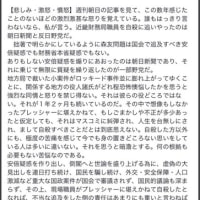
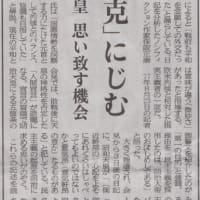
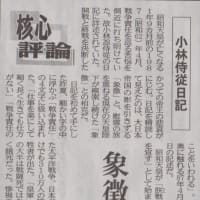
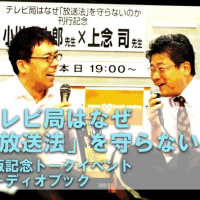

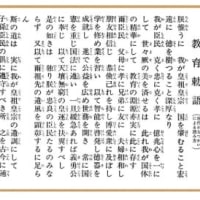



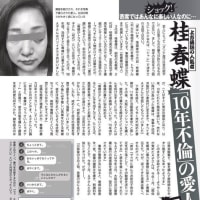
※コメント投稿者のブログIDはブログ作成者のみに通知されます